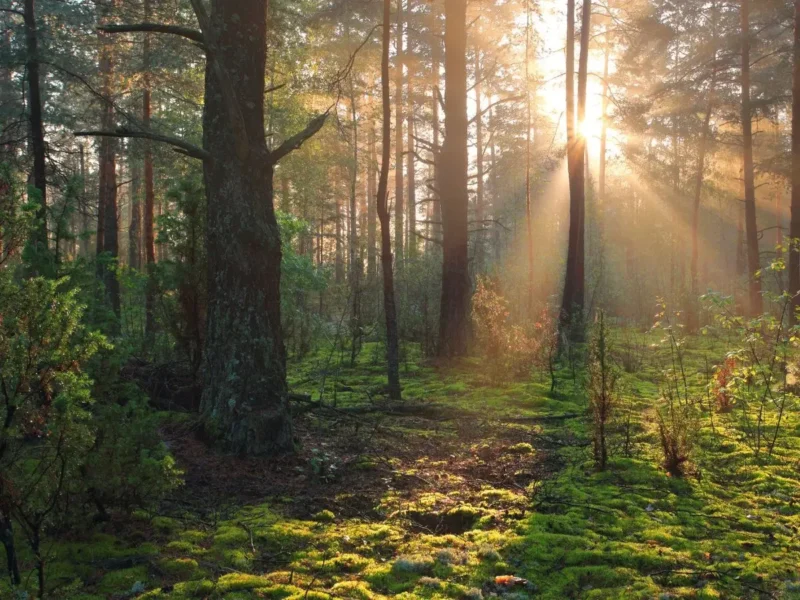Ecus’ Principal Landscape Architect Jenny Sweet explores the links between access to nature and improved mental health.
With World mental health day upon us, it is a perfect time to reflect on the positivity that contact with nature can bring to your life. Ecus’ Principal Landscape Architect Jenny Sweet explores the links between access to nature and improved mental health.
“To sit in the shade on a fine day and look upon verdure is the most perfect refreshment”. Jane Austen
It is common knowledge that green spaces and being close to nature have mental health benefits, but why?
The benefits can be related to how our senses connect us to the natural environment, the scent of flowers, trees, earth, the sound of rustling leaves and grasses in the breeze, the feel of different textures, the shapes and colours we see in nature and the feeling of escapism which help our minds rest.
The natural environment is predominantly green, a quiet and restful soothing colour that can invite harmony and diffuse anxiety. It is therefore not surprising that the international symbol of mental health awareness is a green ribbon.
I consider myself very lucky as my profession enables me to not only connect with nature regularly through site visits but I also have the privilege of being able to design spaces to help people get closer to nature.
Green spaces promote social interactions and physical activities that can release natural highs.
“When you exercise, it increases endorphins, dopamine, adrenaline and endocannabinoid — these are all brain chemicals associated with feeling happy, feeling confident, feeling capable, feeling less anxiety and stress and even less physical pain,” Dr. Kelly McGonigal, health psychologist.
But is this not true of exercising in a gym hall?
Biophilia is defined as the innate human instinct to connect with nature and other living beings. Since the emergence of the Biophilia concept in the mid-1980s, there has been a growth in research on the importance of nature for mental health. (Howell AJ, Dopko RL, Passmore HA, Buro K. Nature connectedness: associations with well-being and mindfulness. Pers Individ Dif (2011) 51:166–71. doi:10.1016/j.paid.2011.03.037).
How can we improve access to nature?
Nature is for everyone. There is “strong support for the premise that nature relatedness is a basic psychological need for humans.” Baxter, D.E., Pelletier, L.G., (2018). Is nature relatedness a basic human psychological need? A critical examination of the extant literature. Canadian Psychology, 60(1), 21-34.
As a society many of us living in urban contexts are so detached from nature, favouring screen time and indoor pursuits, that this fundamental relationship needs re-establishing. Green spaces and nature in cities can be more difficult to find however signs of nature are threaded throughout cities in parks, courtyards, gardens and urban public realm.
One way this connection is being reaffirmed is through the popularity of Forest Schools. Since the Covid pandemic, there has been a boom in the demand.
“Of 200 UK schools surveyed by the Forest School Association (FSA) in 2021, as many as two-thirds have reported an increase in demand for places since March 2020” Positive News, Robin Eveleigh, 7th January 2022.
The concept of a Forest School is still in it’s infancy in the UK, having arrived less than 30 years ago. The movement has come from friluftsliv, which translates as “open-air living” and is fundamental to the Scandinavian way of life. In Scandinavian culture, many workplaces encourage employees to take time out for outdoor activities and exercise with flexible work patterns to maximise daylight hours.
The term friluftsliv dates back to the 1850’s when the famous Norwegian playwright Henrik Ibsen used the expression as a way of describing the benefit of spending time in remote locations for physical and spiritual well-being.
However, the concept goes deeper than simply being outside and exercising, it is about de-stressing, about going back to basics, being part of a bigger whole and enjoying nature whilst respecting it.
“Several Norwegian studies show that one of the main motivations for taking part in friluftsliv is the wish to experience peace and calm. In a public survey from 2020, nine out of ten Norwegians reported that they felt feel less stressed and in a better mood when they were spending time in nature.” “FILUFTSLIV: the Norwegian love for the outdoors” www.visitnorway.com
In order to shift UK culture away from a screen led life and reconnect with nature to aid mental well-being, a fundamental change to the way we approach education could be a step in the right direction. This could be through projects such as Forest Schools.
“If people are to form a healthy, developmental, and sustainable self-led relationship with the natural environment they need a mix of outdoor learning experiences.” “Describing Outdoor Learning” IOL Professional Development Neal Anderson (IOL) 02 August 2021
At Ecus, we have had the pleasure of designing a Forest School for an award winning university which will become a resource for their teaching students and staff to learn about and connect with nature on campus.
The proposals have been sensitively designed around an area of existing trees to maximise the feeling of escapism and being at one with nature, creating a “mini wilderness,” whilst the creation of a pond will further broaden the educational value and boost biodiversity. The use of natural materials will help reinforce the connection with nature.
Once complete, the Forest School will not only be an enjoyable place in which to retreat, but it will act as a valuable tool for the staff and students to gain a greater understanding of nature and how they can then promote outdoor learning in their future careers to aid the next generation’s connection with nature.
“Study nature, love nature, stay close to nature. It will never fail you.” Frank Lloyd Wright
As I reflect on mental health on this important day and contemplate my own experiences, I recognise the value and healing power nature has had for me. I also feel my own sense of professional responsibility to strive to improve access to nature for all, within my projects. Hopefully, small steps towards a greater connection with nature can help people improve their own mental well-being and it will enable us to ‘Make mental health and wellbeing for all a global priority‘.







